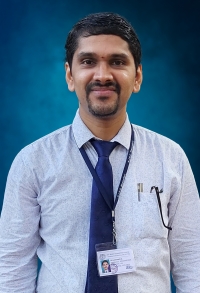About Artificial Intelligence & Machine Learning
The B.E. programme in Artificial Intelligence & Machine Learning at SJEC is a four-year VTU-affiliated undergraduate course with an approved intake of 60 students, introduced in 2020–21. The department has grown into a dynamic center for academic excellence, innovation, and research, supported by modern infrastructure and highly qualified faculty. Its curriculum aligns with global technological advancements, ensuring students build strong theoretical foundations and practical skills in core AI domains.
Faculty expertise spans Machine Learning, Deep Learning, Data Science, Computer Vision, NLP, and Intelligent Systems. Students engage in workshops, technical sessions, ideation events, interdisciplinary projects, and various skill-development programs that prepare them for industry. AIML students consistently perform well in national and international platforms such as the FOSS United National Convention and Google Cloud DevFest, and win hackathons conducted by Microsoft, Kyndryl, NIVIUS, EG, SAP, and others. Several student projects have received funding from KSCST, and students also excel in sports, NCC, and NSS.
The programme equips students with strong foundations in algorithms, programming, system design, data management, and advanced AI technologies, supported by labs, projects, and exposure to areas like AR/VR, predictive analytics, HPC, blockchain, and RPA. Research is a key focus, with faculty securing grants, patents, and multiple publications in reputed venues. Explore more about the Department of AI & ML at SJEC and join its mission to innovate and excel.
Facilities:
To impart value-based quality education with the motive of transforming mankind with excellence and competing areas of engineering, technology and management.
- Focus on the practical aspects of the curriculum to make learning a meaningful and interesting experience.
- Encourage active collaboration with industries, communities, and fellow institutions within the country and abroad.
- Infuse strong moral and ethical principles in students in order to make them conscientious citizens and excellent human beings.
- Cultivate the competitive spirit required for success.
- PEO 1: To provide students with a solid foundation and the ability to use engineering concepts, mathematics, physics, and humanities required to develop, analyse, design, and implement solutions to the problems in intelligent computing and business systems.
- PEO 2: To develop in students, the knowledge of computer science and engineering to work in domains such as artificial intelligence, machine learning and data science.
- PEO 3: To foster in students, the capacity of teamwork through efficient communication in multidisciplinary projects.
- PEO 4: To prepare students for building successful careers in artificial intelligence, data science and business systems to meet the needs of society while incorporating professional ethics.
- PEO 5: To inspire learners to pursue higher education in their desired fields and engage in research.
Engineering Graduates will be able to:
- PO1: Engineering Knowledge: Apply knowledge of mathematics, natural science, computing, engineering fundamentals and an engineering specialization to develop to the solution of complex engineering problems.
- PO2: Problem Analysis: Identify, formulate, review research literature and analyze complex engineering problems reaching substantiated conclusions using principles of mathematics, natural sciences and engineering sciences with consideration for sustainable development.
- PO3: Design/Development of Solutions: Design creative solutions for complex engineering problems and design/develop systems/components/processes to meet identified needs with consideration for the public health and safety, whole-life cost, net zero carbon, culture, society and environment as required.
- Ability to understand, analyze and communicate global, economic, legal, and ethical aspects of business
- PO4: Conduct Investigations of Complex Problems: Conduct investigations of complex engineering problems using research-based knowledge including design of experiments, modelling, analysis & interpretation of data to provide valid conclusions.
- PO5: Engineering Tool Usage: Create, select and apply appropriate techniques, resources and modern engineering & IT tools, including prediction and modelling recognizing their limitations to solve complex engineering problems.
- PO6: The Engineer and The World: Analyze and evaluate societal and environmental aspects while solving complex engineering problems for its impact on sustainability with reference to economy, health, safety, legal framework, culture and environment.
- PO7: Ethics: Apply ethical principles and commit to professional ethics, human values, diversity and inclusion; adhere to national & international laws.
- PO8: Individual and Collaborative Team work: Function effectively as an individual, and as a member or leader in diverse/multi-disciplinary teams.
- PO9: Communication: Communicate effectively and inclusively within the engineering community and society at large, such as being able to comprehend and write effective reports and design documentation, make effective presentations considering cultural, language, and learning differences.
- PO10: Project Management and Finance: Apply knowledge and understanding of engineering management principles and economic decision-making and apply these to one’s own work, as a member and leader in a team, and to manage projects and in multidisciplinary environments.
- PO11: Life-Long Learning: Recognize the need for, and have the preparation and ability for i) independent and life-long learning ii) adaptability to new and emerging technologies and iii) critical thinking in the broadest context of technological change.
- PSO 1: Entrepreneurship and Freelancing: Recognize the tenets of entrepreneurship, freelancing and the prerequisites for starting a business in the IT or related fields.
- PSO 2: Competitive Exams: Participate skillfully in competitive examinations for certification, professional advancement, and admission to higher studies.
